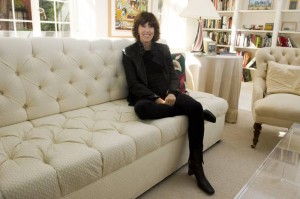
Many of the women I know were stunned by the death of Nora Ephron earlier this week at the age of 71. Their status reports on Facebook reflect this. Their columns, their blog posts, and emails.
Talking to my mother, in the midst of a longer conversation she exclaimed, “Oh, and Nora Ephron.” And in a phone call with another woman friend this morning I heard this non-sequitur. “And I’m so upset about Nora Ephron.”
I think the reason she touched so many of us is because she was so many things. And so are we.
We could admire and aspire to her talent and celebrity, as she was surely one of the most successful female movie directors and screenwriters in Hollwood with films like Heartburn, Silkwood, Sleepless in Seattle, When Harry Met Sally, Bewitched and You’ve Got Mail on her IMDB page.
We could revel in her wit and wisdom as she was a comic essayist of enormous gifts, a novelist, a blogger, and frequent contributor to the New Yorker, the New York Times and other magazines.
She made us laugh time and time again.
We could relate to her personal life, which seemed sophisticated and messy and real. She was a mother and a wife (three times over) and also, reputedly, a great cook and a tasteful homemaker. As a daughter and a sister, we had the sense that she struggled like the rest of us to navigate the tangle (and the treasure) of those familial relationships.
We also sensed that she understood the power and complexity of female friendship. She said as much in her book of essays, I Feel Bad About My Neck: “My friend Judy died last year. She was the person I told everything to. She was my best friend, my extra sister, my true mother, sometimes even my daughter, she was all these things.”
We could relate to her (and envy her) as the quintessential New Yorker born and bred in Manhattan, who at one time occupied an enormous rent controlled apartment in the Apthorp. You half expected to run into her at Zabar’s shopping for smoked salmon or at Laytners shopping for high thread count sheets. And when she moved to the Upper East Side, you could imagine her lunching at Eat or browsing turtleneck sweaters at Agnes B (she didn’t much like her neck but she had a great sense of style).
Those of us north of fifty could relate to her as she grappled with the indignities of age and openly laughed at the ways we obsess over the crow’s feet and neck jangle we can’t bear to see.
A Venn Diagram of Nora Ephorn would illustrate the interesting way that her life intersected with many aspects of American culture, politics, celebrity, arts, and letters: an intern in the Kennedy White House, a reporter for Robert Kennedy’s senate campaign in 1964, a reporter at the New York Post, a magazine writer and pioneer of the New Journalism of Esquire and New York Magazine. She entered the movie business when her memoir/cookbook, Heartburn, about her marriage to Carl Bernstein was made into a movie.
For god sakes, she was portrayed by Meryl Streep!
She may have had it all, but she didn’t make it look easy or simple. With her humor she made it bearable. Alexandra Stanley in this week’s New York Times regrets that Nora didn’t get a chance to respond to Ann-Marie Slaughter’s treatise in The Atlantic about the difficulty of balancing work and family life. According to Stanley, Nora did address this issue in a 1996 Wellesley commencement address (that is also making the Facebook rounds): “Maybe young women don’t wonder whether they can have it all any longer, but in case any of you are wondering, of course you can have it all. What are you going to do? Everything, is my guess. It will be a little messy, but embrace the mess. It will be complicated, but rejoice in the complications. It will not be anything like what you think it will be like, but surprises are good for you. And don’t be frightened: you can always change your mind. I know: I’ve had four careers and three husbands,” Ephron said.
With her four careers and three husbands, we will miss Nora Ephron for the way she embraced the mess, rejoiced in the complications, and changed her mind. She was real, she was funny, she was someone to look up to. Indeed, she was so many things. And so are we.
